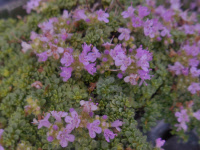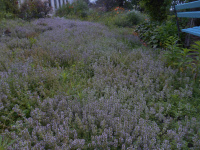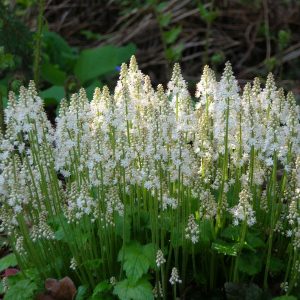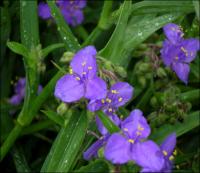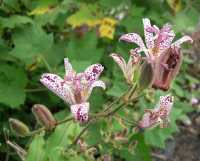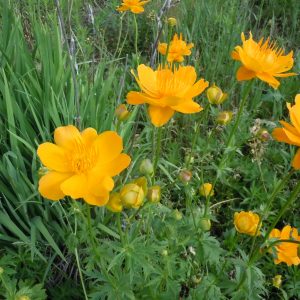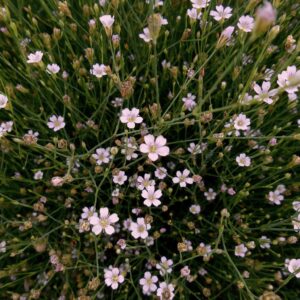Perennials & Biennials
Showing 457–464 of 485 results
-
Thymus serpyllum ‘Minus’ syn. T. praecox ‘Minus’ Dwarf thyme Z 2-9
Purple flowers cover evergreen foliage in late spring on this tiny thyme-leaved plant. Good groundcover or for rock gardens
Purple flowers cover evergreen foliage in late spring on this tiny thyme-leaved plant. Good groundcover or for rock gardens
Size: 3” x 12” and spreading
Care: sun to part shade in moist well-drained to well-drained soil
Native: Europe
Wildlife Value: Deer resistant.
Size: Great for rock gardens, groundcover, drought tolerant.Thymus from the Greek word for “odor” due to the plant’s fragrance. Ancient Greeks made incense with thyme. ‘Minus’ described by Parkinson in 1640. He called it Thymus serphyllum vulgare minus.
-
Thymus serpyllum syn. Thymus praecox Mother-of-thyme, creeping thyme Z 4-9
Short purple spikes in June-July
Short purple spikes in June-July
Size: 3” x 24”
Care: sun in well-drained soil
Native: Europe & Western Asia
Size: groundcover, rock garden, herb, fragrant foliage, thyme lawnThymus from the Greek word for “odor” due to the plant’s fragrance. Ancient Greeks made incense with thyme. This species since at least 1753. Acc’d to Parkinson in 1640 this remedied hysterics in women. Wm. Robinson wrote,”nothing can be more charming than a sunny bank covered with” Thymus serpyllum. LH Bailey extolled it as “prized as an evergreen edging and as cover for rockwork and waste places …The leaves are sometimes used for seasoning.”
-
Tiarella cordifolia Allegheny foam flower Z 3-9
White spikes in spring, gorgeous en masse. Make a great groundcover for shade.
OUT OF STOCK
White spikes in spring, gorgeous en masse. Make a great groundcover for shade.
Size: 6-12”x 12-24” spreading
Care: Shade to part shade in moist to moist well-drained soil
Native: Novia Scotia to Georgia, native to Wisconsin.
Awards: Royal Horticultural Society Award of Merit.Tiarella is Latin meaning little tiara referring to the form of the pistil. The common name is derived from the form of blossoms. Cherokee used this plant to remove the white coating on their tongues. For the Iroquois it increased the appetite of children and cured sores in their mouths. One of 1st No. American plants sent to Europe – grew in Tradescant the Elder’s South Lambeth nursery in 1634. Grown at America’s 1st botanic garden, Elgin Botanic Garden 1811. Botanist L.H. Bailey described Tiarella cordifolia as:” An elegant plant well worthy of general culture.” Pressed specimen in Emily Dickinson’s herbarium.
-
Tradescantia bracteata Spiderwort Z 4-9
Three-petaled rosy purple petals frame bright yellow stamens, open mornings and close by noon from June-August. Cut back for rebloom.
Three-petaled rosy purple petals frame bright yellow stamens, open mornings and close by noon from June-August. Cut back for rebloom.
Size: 12-18” x 12”
Care: full sun to part shade in moist well drained soil
Native: Minnesota south to Texas - Wisconsin native
Wildlife Value: attracts bees & butterfliesEnglish herbalist John Parkinson (1567-1650) named the Genus after John Tradescant the Younger who sent Tradescantia virginiana it to his father, gardener to Kings James III and Charles I. This prairie plant collected before 1938.
-
Tradescantia virginiana Spiderwort Z 4-9
Purple umbels of three petals with prominent yellow stamens June – October, opening in the morning and closing at noon.
Purple umbels of three petals with prominent yellow stamens June – October, opening in the morning and closing at noon.
Size: 18-24" x 24"
Care: Full sun to part shade in moist to moist well-drained soil
Native: From New York to South Dakota, Virginia and Arkansas and all states in between. Wisconsin native.
Wildlife Value: Bumblebees and honeybees eat the nectar and collect the pollen.Named after John Tradescant, an English botanist and gardener to Kings James III and Charles I. Parkinson (1567-1650) explains the origin of this plant: “This Spider-wort is of late knowledge, and for it the Christian world is indebted unto that painfull industrious searcher, and lover of all natures varieties, John Tradescant who first received it of a friend, that brought it out of Virginia,” (1639). It was probably sent to mainland Europe in 1500’s. Grown at America’s 1st botanic garden, Elgin Botanic Garden 1811. Tradescantia was cherished by the Dakota Indians for its beauty. Cherokee ate the young greens and prescribed it to cure stomachaches after overeating, female illnesses, cancer, and insect bites. Menominee revived those “defiled by touch of bereaved.” Natives applied a poltice of the leaves topically for insect bites and stings. By 1659 ones with white, light blue and reddish flowers grown in England. According to Monticello.org the root exuded a gummy liquid which, when inserted into a cut on top of a person’s head remedied the person’s “craziness.”
-
Tricyrtis hirta Japanese Toad Lily, Hairy toadlily Zone 4 – 8
From August to October small clusters of flowers bloom, six white petals covered with purple spots as close as those of a leopard. These tend to self-seed around a bit.
From August to October small clusters of flowers bloom, six white petals covered with purple spots as close as those of a leopard. These tend to self-seed around a bit.
Size: 2-3' x 12"
Care: Moist well-drained soil in part shade to shade
Native: Japanese islands of Honshu, Shikoku and Kyushu
Awards: Oklahoma Proven 2010, Rated good by the Chicago Botanic GardenName Tricyrtis is Greek meaning “three cavities”, supposedly describing the outer petals. Originally collected for the West by Swedish Carl Pehr von Thunberg (1743-1828) who spent seven years collecting plants in South Africa, Japan, and Indonesia, Japan in 1775-1776.) Named by English botanist Sir Joseph Hooker in 1863. The Japanese name for this plant hototogisu, means “cuckoo” because the purple dots on the petals resemble the spots on the cuckoo bird’s chest.
-
Trollius europaeus Globe flower Z 5-8
Ball-shaped deep golden buds opening to nearly orange cups with prominent stamens from May to June & sporadically in September
Ball-shaped deep golden buds opening to nearly orange cups with prominent stamens from May to June & sporadically in September
Size: 18-24”x 24”
Care: Full sun to part shade in moist to wet soil
Native: Northern EuropeThe name Trollius is derived from the old Swiss-German word trol meaning “something round,” referring to the shape of the flower. Swedes used the fragrant drying flower petals for a strewing herb. Introduced to European gardens by the 1500’s and cultivated in America in the 1700’s. Grown in the Eichstätt Garden, the garden of Johann Konrad von Gemmingen, prince bishop of Eichstätt in Bavaria, c. 1600.
Grown by Thomas Jefferson.
-
Tunica saxifraga syn. Petrorhagia saxifraga Tunic flower Z 4-8
Free blooming pixie, palest of pink blossoms from June through October on wiry stems form a 4" tall mound.
Free blooming pixie, palest of pink blossoms from June through October on wiry stems form a 4″ tall mound.
Size: 6" x 8"
Care: Full sun in well-drained soil.
Native: Pyrenees and Alps
Wildlife Value: Drought tolerant.
Awards: Royan Horticultural Society Award of Merit.
Size: Perfect for rock gardens, front of borders or groundcover.Tunica is Latin meaning tunic or coat referring to overlapping bracts beneath the flower. Before 1753. Near 1900 William Robinson (1838-1935) described the Tunic flower as having “elegant little rosy flowers … a neat plant for the rock garden and fringes of borders and thrives like a weed between the stones in a rough stone wall.”

